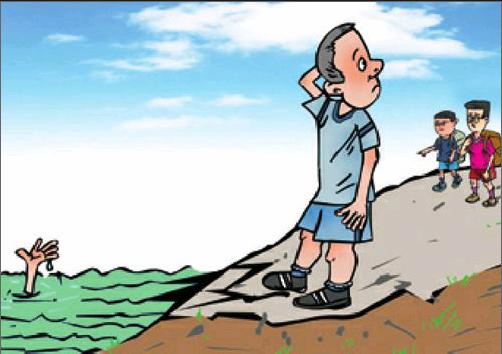Should Minors Be Encouraged To Save Others in Danger?
2014-08-27

Li Weiwei, an 8-year-old girl, drowned in a river while attempting to rescue a friend in southwest Chinas Sichuan Province in April. The local government filed an application to posthumously award her a special title for her heroic actions, but the application was denied by higher-level authorities, stating that “acting boldly to help others should not be encouraged among minors.” Just a few months later, however, Lis award was approved and granted.
To protect others from injury or dangerous situations, regardless of ones own safety, is a virtue that has long been admired and commended. However, should we honor a minor who risks his or her own life to save others?
Some agree that the upper-level government was right to initially deny the award. Others believe the decision to honor Li for her bravery and selflessness should not be influenced by other factors, and thus the application should not have been questioned. Far more complicated than whether or not an honorary title should have been awarded, however, is how we should educate children to help others in danger, and what the government should do in cases similar to Lis.
Non-encouragement
Wang Xuejin (www.163.com): Sichuan Provinces jianyiyongwei (acting selflessly for righteousness) foundation has made it clear that there is no specific clause in the provincial regulations regarding the honoring of minors who perform such acts. It also said that because Li was a minor, she did not have the full mental or physical capacity for her civil conduct. Therefore, her actions that were taken without awareness of the dangers do not legally qualify as “acting selflessly for righteousness.”
Additionally, it has yet to be discussed whether Lis conduct was truly conscientious or noble. An 8-year-old with undeveloped cognition hardly possess a clear understanding of “righteousness” or “selflessness.”Aiding her companion who fell into the river was simply a basic human reaction.
Should a child of that age understand these concepts, and recall learning from his or her parents or teachers about rescuing a drowning person, such an education of “selfless devotion” goes against the very nature of childrens growth or safety. Its not in the interests of minors to encourage such sacrifices.
Wang Yunfan (Beijing Times): Awarding a minor the title of jianyiyongwei inevitably involves the publicity of his or her heroic deed, which is equivalent to advocating and encouraging such behavior. However, not bestowing an award does not affect the publics perception of the “young hero.”endprint
It is reported that the local authorities reversed their initial decision, later awarding Li the title, because they listened to public opinion. Despite this change of heart, the debate continues. The decision of rewarding Li may meet with no less opposition than the previous decision to deny the award.
To the local authorities credit, they respected and responded to public outcry. But such sentiments of the general public tend to be multi-directional. No matter how fierce the contention, decision-making should first and foremost be based on the law. More attention should be focused on the legal stipulations that state minors should not be encouraged to engage in risky and potentially deadly behavior for the sake of others.
Zhang Zhang (Guangzhou Daily): Jianyiyongwei is a traditional virtue that will never be outdated. Anyone who risks his or her own life to protect others in danger should be recognized as a good example for the society; Lis conduct, then, was indisputably heroic. Though she was first denied the honor, the local authorities never doubted the nature of her good deed. They were mindful to avoid giving the incorrect impression to other minors by not approving the award, trying to curtail further unnecessary tragedies that might result from similar actions.
The focus should be on the significance of this case as a future precedent rather than whether or not Li was posthumously awarded the honorary title. The most important lesson here is that minors should never be pressured to save others at the cost of their own lives. Instead, they should be taught to help those in danger through safe and responsible means, on the precondition that they not injure or endanger themselves.
The Code of the Daily Behavior of Primary and Middle School Students put forth by the Beijing Municipal Government in 2003 has removed jianyiyongwei as a moral requirement for students, instead asking every student to “report illegal and criminal conduct in time, be brave and smart while in danger, and learn to protect yourself.”In Ningbo, a city in east Chinas Zhejiang Province, local regulations explicitly prohibit minors from participating in emergency rescue and disaster relief. These cases show that it has become widely accepted in China to put minors self-protection and safety first in cases of emergency. On that precondition, smart methods should then be used to help others. endprint
endprint
A deserved honor
Pan Hongqi (Beijing Youth Daily): Not encouraging minors to risk their own lives to save others has been a big change in Chinas juvenile moral education over re- cent years. However, denying a minor the honor she deserves after sacrificing her own life is unfair.
Rewarding young heroes like Li does not necessarily conflict with the new proposal of non-encouragement. The local government can posthumously award Li the title in honor of her conduct, and then use her tragic case to teach others the importance of self-protection while rescuing others in danger.
Gao Mingyong (The Beijing News): The standard for awarding the title of jianyiyongwei takes into account only that one has saved others without considering his or her own safety, not how old and or how widely celebrated that person is. In such cases, even a criminals heroic behavior should theoretically be recognized. Perhaps most importantly, the law makes no stipulations regarding what sort of people should or should not risk their lives to save others. If there is such language, then this is tantamount to discrimination.
One who cannot protect himself or herself, or does not know about the potentially costly dangers of doing so, certainly should not be encouraged to rescue others. However, denying her selflessness is not only disrespectful to Li and her family, but also discourages future acts of heroism. As an 8-year-old, Li deserved perhaps even more recognition and praise.
The local authorities had initially decided to offer Lis family monetary compensation in lieu of awarding her the title. Lis family made it clear, “We are asking for an honor for our daughter, not money.” Everyones life is valuable. While Lis actions should not necessarily be encouraged among minors, awarding the girl for her self-sacrifice is absolutely necessary.endprint
